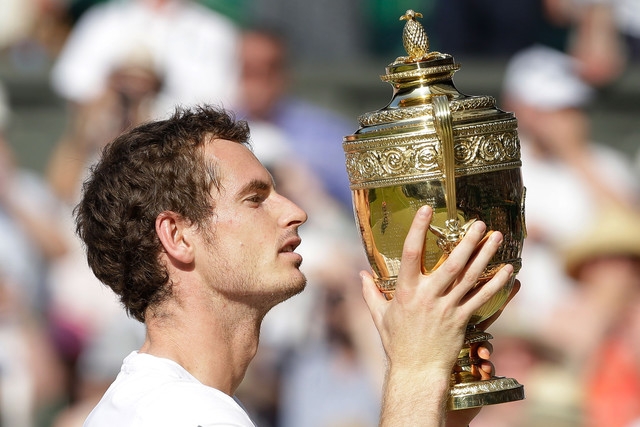Even before the arrival of the royal baby, Britain has cause to celebrate a remarkable triumph: the shattering of 77 years of home futility at tennis’ most hallowed grounds. Andy Murray, Glasgow-born and London’s favourite sporting son, finally broke through at Wimbledon last Sunday, ensuring the championship will stay at home for the first time since Fred Perry’s victory in 1936.
Murray had shown promising, gradual progression at Wimbledon since 2008: quarterfinal exit, semifinal exit, semifinal exit, semifinal exit, and, finally, a brutal championship defeat to Roger Federer last July. Progress leads to expectations; in Britain, without a Wimbledon champ since World War II, those expectations are ruthlessly intensified. Before a kingdom awaited a newborn child with bated breath, their scrutiny was fixated on Murray, painfully on the brink.
The Scottish sensation benefited from a stunningly tranquil route to the final. Before meeting top-ranked Novak Djokovic for the championship, none of Murray’s opponents slotted higher than #20, the product of stingy Frenchman Jo-Wilfried Tsonga’s early withdrawal and the sudden impotence of two tennis legends. Just two weeks after extending his now-automatic French Open dominance (dropping only four sets en route to the championship), Rafael Nadal flopped out of Wimbledon in historic fashion, suffering a first-round sweep to journeyman Belgian Steve Darcis.
With his prospective quarterfinal opponent out of the way, it appeared Federer would cruise to the final four – only the Swiss legend crashed out in the second round against Ukraine’s Sergiy Stakhovsky. It was Federer’s earliest Grand Slam defeat since 2003, and Nadal’s only first-round loss in 35 major appearances. Somehow, their failures coincided – precisely the alignment Murray needed to reach the final unscathed.
Regardless of the bracket’s potency, Murray’s breakthrough went beyond fortune. The exodus of top men’s stars paled in comparison to the women’s side, where the top three seeds were gone by Round 4 and 15th-ranked Marion Bartoli outlasted 23rd-ranked Sabine Lisicki in the final. The top two men still faced off in the final; Novak Djokovic has risen past Nadal and Federer in recent years, claiming five of the last 11 Grand Slam titles. Even before Murray dispatched a tired Djokovic last Sunday, Britain’s struggles at Wimbledon were bound to be broken soon.
Murray lost the 2012 Wimbledon final to Federer in four sets, marking his opponent’s 17th Grand Slam. One month later, he was an Olympic gold medalist in London, this time toppling Federer on the very same court, proving he could beat the best competition in the right location. Nearly eight decades in the making, Britain’s tennis exorcism was now just a matter of context.
Britain’s fixation on Murray at Wimbledon, understandably spurred by historical letdown, is similar (on a substantially larger level) to Canada’s dependence on 22-year old Milos Raonic. Prior to Murray’s ascension, Tim Henman was the only British player that could challenge for Grand Slams, though he never surpassed his four semifinal appearances at Wimbledon. Currently ranked 15th in the world, Raonic is the sole Canadian man that could conceivably challenge for major tennis titles. (23-year-old Vernon native Vasek Pospisil is second best at #93.) Canada’s tennis infatuation will never match that of other countries, but a semifinal berth in this year’s Davis Cup has the country tentatively close to international supremacy.
Essentially alone on the singles’ side, Raonic’s best Grand Slam showings have come in fourth-round defeats at the Australian Open and US Open. Wimbledon has proved to be a tougher task, marked by three straight second-round losses. Still, a heroic performance at last year’s Olympics has shown Raonic can hang with the top of tennis’ second tier: Tsonga, Juan Martin del Potro and others nipping at the heels of the elite. There’s no “Wimbledon” landmark for Canadian tennis players to strive for, but Raonic’s progress shows that he, like Murray, may soon be on the verge of something big.

